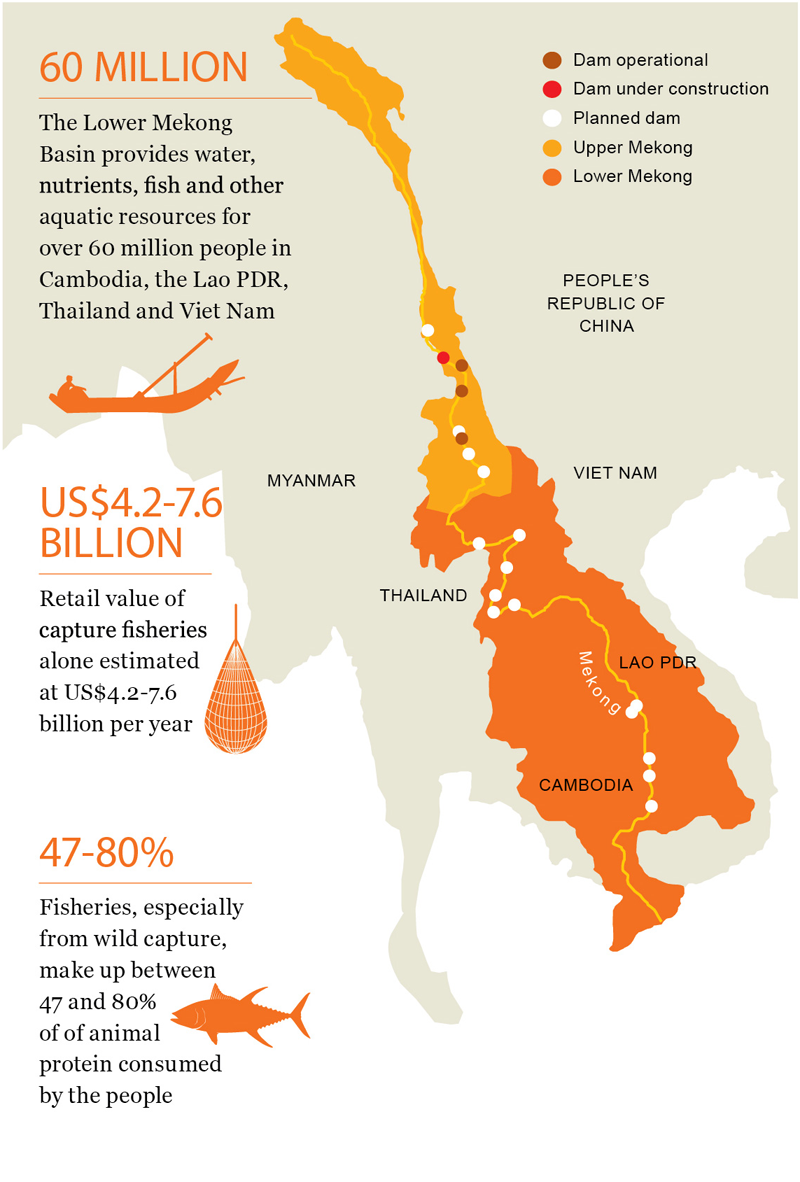Regional cooperation on Mekong River in tatters
Posted on January, 10 2013
Gland, Switzerland – Ministers from Cambodia, Laos, Thailand and Vietnam meeting next week in the Lao city of Luang Prabang must put derailed decision-making on Mekong River mainstream dams back on track or risk sabotaging management of one of the world’s great rivers, warns WWF.
Environment and water ministers had agreed in 2011 to delay a decision on building the US$3.5-billion Xayaburi dam pending further studies on its environmental impacts. This agreement was swept aside last November when Laos decided to forge ahead with construction of the controversial dam.The 16-17 January Ministerial-level meeting of the Mekong River Commission (MRC) – an inter-governmental agency made up of representatives from the four lower Mekong countries – will put transboundary cooperation to the test and the fate of the Mekong River, vital to the livelihoods of 60 million people.
“The Xayaburi dam experiment threatens the health and productivity of the Mekong River and Delta, and could leave millions of people facing critical food insecurity,” said Dr. Jian-hua Meng, WWF’s Sustainable Hydropower Specialist. “Ministers must take a stand against Xayaburi-style diplomacy or it will be the dangerous precedent for the future.”
As the first dam to enter the MRC’s consultation process, the Xayaburi project is a crucial test case for 10 other dams proposed for the lower mainstream of the river. The MRC process requires countries to jointly review development projects proposed for the Mekong mainstream with an aim to reach consensus on whether or not they should proceed. Laos is now constructing Xayaburi dam without consensus among its neighbours or notifying the MRC.
In November last year, the MRC delivered the much anticipated concept note for a joint study aimed at filling critical data gaps and guiding sustainable development of the Mekong River, including mainstream hydropower projects. The study was requested by Ministers at the 2011 MRC meeting.
“Without the results of the study, dam development on the lower Mekong mainstream is now largely guesswork,” added Dr. Meng. “A fix it as you go approach with Xayaburi dam, and throwing money at problems as they inevitably arise, is not sound engineering nor smart development.”
Thailand is slated to be the prime consumer of the electricity produced by the Xayaburi dam, and at least four Thai banks have confirmed their interest in financing the project, despite the acute environmental and social costs, and the uncertainties surrounding the financial return of the project.
“Thailand must act responsibly and cancel its premature power purchase agreement until there is regional consensus on dams,” added Dr. Meng. “And if the Thai banks do their risk assessment homework well, and value their international reputation and financial returns, they’d do well to reconsider and to pull out of this project.”
WWF urges Mekong ministers to defer a decision on the dam for 10 years to ensure critical data can be gathered and a decision can be reached using sound science and analysis.
“If decision-making continues to occur outside of the MRC, the institution will soon lose its legitimacy and US$300 million of international donor support to the Commission will be wasted,” added Dr. Meng. “Mekong countries need to stop wasting time picking apart the MRC process, and start using common sense and sound science again to reach joint decisions that are to the benefit of all.”
Reviews of the dam development have identified serious gaps in data and weaknesses with the proposed fish passes for the mega dam, and confirmed the Xayaburi project will block part of the sediment flow, destabilising the river’s ecosystem upon which farmers, fishers and many other economic sectors depend.
WWF advises lower Mekong countries considering hydropower projects to prioritise dams on some Mekong tributaries that are easier to assess and are considered to have a much lower impact and risk.

Notes to Editors:
• Download Photos: An international delegation of ambassadors, donors and NGOs, including WWF, attended a meeting with the Laos government in July 2012 to listen to presentations about the project and inspect the dam site at Xayaburi. Credit: © Marc Goichot / WWF-Greater Mekong
• Download Infographic: Existing and planned dams on the mainstem of the Mekong River. Credit: © WWF.
About WWF
WWF is one of the world's largest and most respected independent conservation organizations, with over 5 million supporters and a global network active in over 100 countries. WWF's mission is to stop the degradation of the earth's natural environment and to build a future in which humans live in harmony with nature, by conserving the world's biological diversity, ensuring that the use of renewable natural resources is sustainable, and promoting the reduction of pollution and wasteful consumption.











